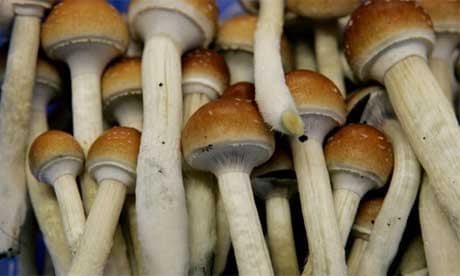A drug derived from magic mushrooms could help people with depression by enabling them to relive positive and happy moments of their lives, according to scientists including the former government drug adviser, Professor David Nutt.
Two studies, for which scientists struggled to find funding because of public suspicion and political sensitivity around psychedelic drugs, have shed light on how magic mushrooms affect the brain.
Nutt, from Imperial College London, was sacked as a government drug adviser after claiming tobacco and alcohol were more dangerous than cannabis and psychedelic drugs such as ecstasy and LSD.
He believes prejudice and fear have prevented important scientific work on psychedelic drugs. Research began in the 1950s and 60s but was stopped by the criminalisation of drugs and stringent regulations which made the work costly.
"Everybody who has taken psychedelics makes the point that these can produce the most profound changes in the state of awareness and being that any of them have experienced," said Nutt.
The drugs had been used for millennia, he said, since psychedelic mushrooms grew in the Elysian fields of Greece. Aldous Huxley wrote The Doors Of Perception about the insight such drugs gave him into the life of the mind.
The studies, led by Robin Carhart-Harris, also of Imperial College, looked at the effect that psilocybin, the active ingredient in magic mushrooms, has on the brain through the use of a magnetic resonance imaging (MRI) scanner. The first study on healthy volunteers, published in the journal Proceedings of the National Academy of Sciences (PNAS), surprised the researchers. They had assumed the drug might increase activity in certain parts of the brain. Instead, it decreased it in the "hub" regions which link different areas.
"This loss of connectivity might mean consciousness is less constrained by inputs from the outside world via the senses, which could explain why people can imagine things very vividly," said Nutt.
The 10 men and five women who volunteered experienced changes in visual perception, extremely vivid imaginings and changes in their perception of time and of size and space.
The MRI scans showed lowered bloodflow to regions linked to the ego, the sense of self and personality.
A second study, to be published on Thursday in the British Journal of Psychiatry, gave volunteers cues to remember positive events in their lives such as their wedding or performance in a play. Their recollection became very vivid. "It was almost as if rather than imagining the memories, they were actually seeing them," said Carhart-Harris. "This could be very useful in psychotherapy, for instance in people with depression who find it very difficult to remember good times and are stuck in the negative."
The team are now hoping to do a further study which will involve giving psilocybin to depressed people who are undergoing psychotherapy, in the hope that it will allow them to relive times of past happiness.
The studies showed that psilocybin worked on the same areas of the brain as the SSRI antidepressants such as Prozac, as well as talking therapies and meditation as carried out by skilled practitioners. But the advantage over pills, the team believes, is that the positive effect could be long-lasting.








